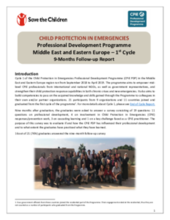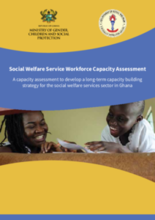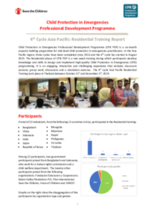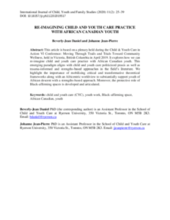Displaying 131 - 140 of 477
This study examined whether caseworker demographic factors, attitudes towards evidence-based practices (EBPs) and organizational factors predict caseworker referrals. Relying upon tenets of the Theory of Planned Behavior, this study also examined whether intention to refer predicts caseworker referrals to an EBP.
This report presents results from a survey administered to graduates of the Child Protection in Emergencies Professional Development Programme (CPiE PDP) in the Middle East and Eastern Europe region to evaluate if and how the CPiE PDP has influenced their professional development and to what extent the graduates have practiced what they have learned.
In line with principles outlined by the Early Childhood Development Action Network and the International Task Force for Teachers for Education 2030, the following are five key actions that governments, civil society organizations, and funding agencies must take to support the early childhood workforce to ensure continuity and quality in efforts to promote nurturing care.
This two-module course is aligned to the Guidelines to Strengthen the Social Service Workforce for Child Protection and aims to equip the learner with key strategies to strengthen social service workforce.
This report notes existing gaps and needs in social service provision and provides recommendations for specific actions to strengthen the social welfare workforce in Ghana.
The study is reflecting on the nature and features of social work with families with children, attempting to discuss social work as assistance and apprehension and to detect whether there is any causal link between the efficiency of social work and the narrative approach and the “unstoried”, “faceless” condition of the families. The authors argue that professional attitude aimed at providing child protection support is not possible without knowing the story of families with children.
Child welfare professionals have a deep and often quiet impact on children’s lives—working to connect families with resources, determining appropriate placements, and responding around the clock to address emergencies.
This report details the 4th cycle of the Asia Pacific Child Protection in Emergencies Professional Development Programme (CPiE PDP) Residential Training, which took place in Thailand between October 21st and November 3rd, 2019.
This toolkit is designed for parents/caregivers and the social service workforce guiding them. It provides practical tips that can be implemented quickly and mini lessons on topics of importance to anyone raising or supporting a child.
This article explores how we can re-imagine child and youth care practice with African Canadian youth.






